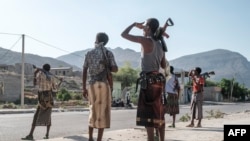Gunfire was heard in at least two towns in Ethiopia's Amhara region on Sunday as thousands protested against a federal government order to integrate regional special forces into the police or national army, residents said.
Members of Amhara's special forces and allied militias vowed to oppose Thursday's order, setting up a standoff with the government of Prime Minister Abiy Ahmed, who said in a statement that the plan was "for the sake of Ethiopia's national unity."
The order applies to all of Ethiopia's 11 regions, which have their own regional armies and the right use their own language, but has been received particularly badly in Amhara, the second biggest, which has fallen out with Abiy recently.
A resident of Gondar, where a large protest was taking place, said members of the Amhara special forces had fired their weapons into the sky all night in defiance of the order.
Two residents of the town of Kobo said they heard artillery fire outside the town. It was not immediately clear who was responsible. There were protests in at least six other towns, residents said, all speaking on condition of anonymity out of fear for their safety.
Spokespersons for Ethiopia's federal government and army and for the Amhara regional government could not be immediately reached for comment.
A media outlet run by the regional government quoted Amhara President Yilkal Kefale as saying the federal government's order was being misunderstood as requiring the disarmament of the special forces. In fact it was simply organizing regional forces under federal security institutions, it quoted him as saying.
Special forces and militias from Amhara fought in support of the federal army during its two-year war in the neighboring Tigray region. The conflict, which killed tens of thousands, ended with a truce last November.
But in recent months, Amhara leaders and activists have accused Abiy's government of turning a blind eye to atrocities committed against ethnic Amharas living in the neighbouring Oromiya region and of planning to hand back territory captured from Tigray forces during the war.
They say the dissolution of their region's special forces would leave them vulnerable to attacks from Tigray and Oromiya.
The government spokesperson did not immediately respond to a request for comment on these charges.






